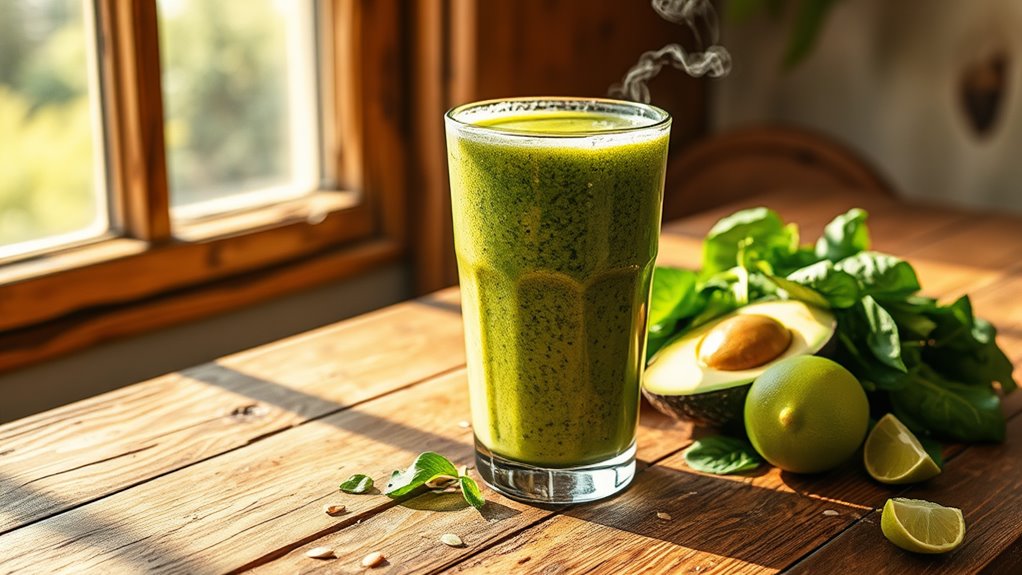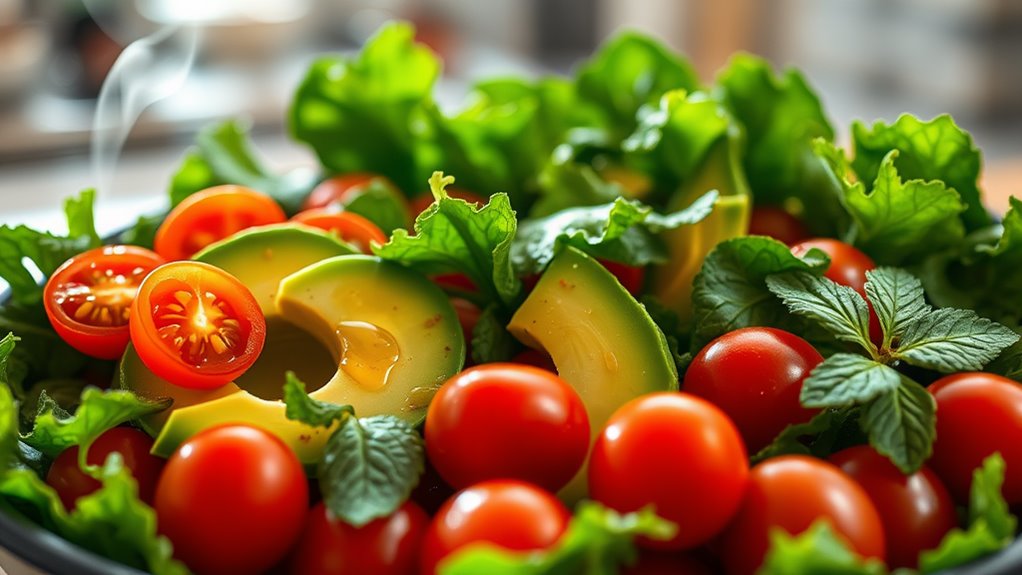Bloat Be Gone – This Gut Reset Plan Actually Works
If you’re struggling with bloating, you might want to consider a structured gut reset plan. This approach isn’t just about eliminating discomfort; it’s about understanding the root causes of your symptoms and finding effective solutions. By identifying inflammatory foods and incorporating mindful eating, you can significantly improve your gut health. But how do you start this journey, and what specific changes should you make to ensure lasting results? Let’s explore the essential components of this plan.
Key Takeaways
- The gut reset plan focuses on eliminating inflammatory foods and prioritizing whole foods to alleviate bloating and enhance digestion.
- A structured three-week approach includes elimination, reintroduction, and maintenance phases for effective gut health restoration.
- Mindful eating and hydration are emphasized to improve digestion and nutrient absorption during the reset process.
- Tracking symptoms and maintaining a food journal help monitor progress and make necessary dietary adjustments.
- Incorporating probiotics and prebiotic-rich foods supports long-term gut balance and overall health maintenance.
Understanding Bloat and Its Causes
Bloat can feel like an uncomfortable balloon inflating in your abdomen, making it crucial to understand its causes. Common culprits include overeating, consuming gas-producing foods, and food intolerances. Stress can also disrupt your gut health, leading to bloating.
To combat this, consider implementing a gut health plan that focuses on balanced nutrition, hydration, and mindful eating. Incorporate fiber-rich foods and probiotics to support digestion. Additionally, a natural gut reset drink can be beneficial in providing quick relief from bloating and digestive discomfort.
Additionally, paying attention to portion sizes and eating slowly can help reduce discomfort. By identifying triggers and adjusting your diet, you can significantly alleviate bloating and improve your overall gut health.
The Importance of a Gut Reset
Why is a gut reset essential for your overall health?
Your gut plays a crucial role in digestion, nutrient absorption, and immune function.
When your gut’s microbiome is out of balance, it can lead to issues like bloating, fatigue, and even mood swings.
A gut reset helps restore this balance, enabling beneficial bacteria to flourish while reducing harmful ones.
This process can enhance your digestive efficiency, boost your energy levels, and improve your overall well-being.
By prioritizing a gut reset, you’re taking a proactive step towards better health and a more vibrant life.
In addition, implementing a 24-hour gut reset protocol can provide immediate relief and long-term benefits for your digestive health.
It’s time to give your gut the care it deserves!
Key Components of the Gut Reset Plan
A successful gut reset plan includes several key components that work together to restore your microbiome’s balance.
By incorporating these elements, you can enhance gut health and reduce bloating effectively.
- Hydration: Drink plenty of water to help digestion and flush out toxins.
- Probiotics: Include probiotic-rich foods or supplements to replenish beneficial bacteria.
- Mindful Eating: Pay attention to portion sizes and chew your food thoroughly to aid digestion.
Incorporating lemon water into your morning routine can further support your gut health by kickstarting digestion and providing a boost of hydration.
Implementing these components can create a solid foundation for your gut reset, setting you on the path to improved health and well-being.
Foods to Embrace and Avoid
To reset your gut, focusing on the right foods is essential.
Incorporating anti-inflammatory foods and gut-friendly probiotics can enhance your digestive health, while avoiding common bloating triggers will help you feel your best. Additionally, including a natural anti-bloating drink can provide quick relief from discomfort and support overall digestion.
Let’s explore which foods to embrace and which to steer clear of for optimal gut function.
Anti-Inflammatory Foods
What if you could significantly improve your gut health simply by adjusting your diet?
Embracing anti-inflammatory foods can help reduce bloating and enhance digestion.
Focus on incorporating these beneficial options into your meals:
- Leafy greens: Spinach and kale are packed with antioxidants.
- Berries: Blueberries and strawberries can lower inflammation levels.
- Fatty fish: Salmon and mackerel are rich in omega-3 fatty acids.
Avoid processed foods, refined sugars, and trans fats, as they can exacerbate inflammation.
Gut-Friendly Probiotics
How can incorporating gut-friendly probiotics into your diet transform your digestive health?
Probiotics, found in foods like yogurt, kefir, sauerkraut, and kimchi, help balance your gut microbiome, enhancing digestion and nutrient absorption.
They can also support your immune system and reduce inflammation.
Aim for foods rich in live cultures, as they deliver beneficial bacteria directly to your gut.
On the flip side, avoid heavily processed foods that can disrupt this balance.
By making these simple dietary changes, you can promote a healthier gut, alleviate bloating, and improve overall wellness.
Start embracing these probiotic-rich foods for a happier digestive system!
Bloating Triggers to Avoid
Have you ever wondered which foods could be contributing to your bloating?
Identifying and avoiding certain triggers can help you feel more comfortable.
Here are some common culprits you might want to limit:
- Dairy Products: Lactose intolerance can lead to gas and bloating for many people.
- Cruciferous Vegetables: Broccoli, cauliflower, and Brussels sprouts are healthy but can cause gas due to their fiber content.
- Beans and Legumes: These foods contain oligosaccharides, which can be tough for your digestive system to break down.
Hydration and Its Role in Digestion
Hydration plays a crucial role in digestion, influencing everything from nutrient absorption to waste elimination.
When you’re well-hydrated, your body efficiently breaks down food, allowing essential nutrients to enter your bloodstream.
Water aids in the production of digestive juices, which help process what you eat.
Additionally, staying hydrated softens stool, preventing constipation and promoting regular bowel movements.
Aim for at least eight 8-ounce glasses of water daily, adjusting based on activity level and climate.
Remember, beverages that contain caffeine or alcohol can dehydrate you, so balance them with water.
Keeping hydrated is key to a healthy digestive system. Moreover, incorporating morning routines like deep breathing techniques can further enhance your overall gut health and mental clarity.
Incorporating Mindful Eating Practices
While you might be eager to dive into your next meal, incorporating mindful eating practices can significantly enhance your digestion and overall well-being.
By focusing on the experience of eating, you’ll improve your relationship with food and help your gut function better.
Here are some practical tips:
- Chew slowly: Breaking down food aids digestion and allows you to savor flavors.
- Limit distractions: Eating without screens or multitasking helps you pay attention to hunger cues.
- Listen to your body: Tune into how you feel during and after meals to identify what works for you.
Incorporating mindful eating practices can also complement natural remedies for digestion, providing a holistic approach to gut health.
Mindful eating can transform your eating habits for the better.
Monitoring Your Progress and Adjustments
How can you effectively track your gut health journey?
Start by keeping a food diary, noting what you eat and how it affects your digestion. This helps identify trigger foods and patterns.
Regularly monitor your symptoms, like bloating or discomfort, using a scale from 1 to 10. Consider weekly check-ins to assess your energy levels and mood, which are linked to gut health.
Adjust your diet based on these findings; if a food causes discomfort, eliminate it temporarily. Incorporating holistic approaches can further support your journey to restore gut health and balance.
Remember, progress isn’t always linear, so be patient and flexible.
This approach fosters awareness, guiding you to make informed adjustments along the way.





